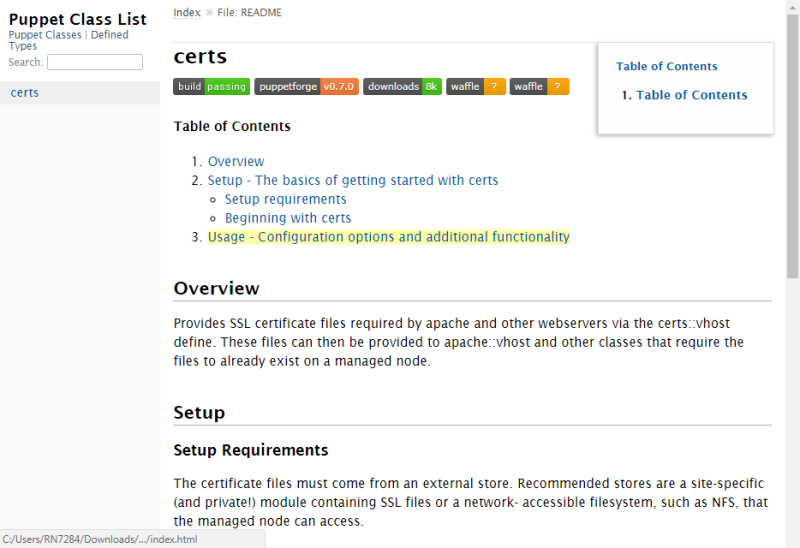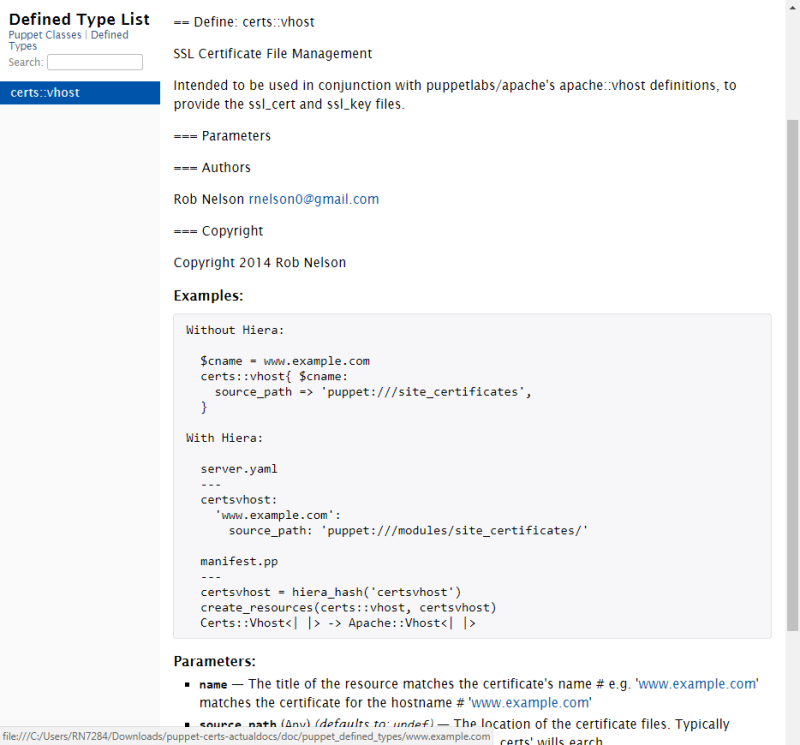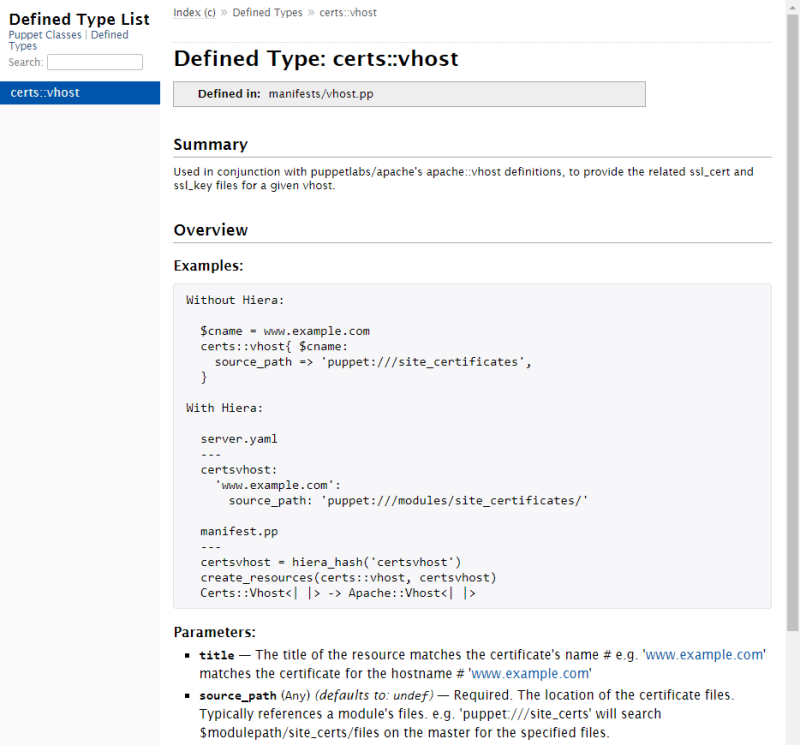

Self-documenting Puppet modules with puppet-strings | rnelson0
source link: https://rnelson0.com/2017/12/07/self-documenting-puppet-modules-with-puppet-strings/
Go to the source link to view the article. You can view the picture content, updated content and better typesetting reading experience. If the link is broken, please click the button below to view the snapshot at that time.
Standard
Self-documenting Puppet modules with puppet-strings
Documentation is hard. Anyone who has been in IT long enough will have tales of chasing their tails because of incorrect or outdated docs, or even missing docs. Documentation really benefits from automation and ease of creation. For Puppet modules, there exists a tool called puppet-strings that can help with this. There are probably other tools for this, but puppet-strings is developed by Puppet and will likely be integrated into the Puppet Development Kit, so I have chosen it as my solution.
Around this time last year, November of 2016, Will Hopper wrote a blog post about how to use puppet-strings. There is also some mention of puppet-strings in the Style Guide. At the time of that blog post, puppet-strings was mostly documented in that blog post and I didn’t jump on the project, but it turns out it’s really easy to leverage. Let’s give a shot.
Converting a Module to use puppet-strings
We should be able to convert any module to use puppet-strings, whether it’s small or large, simple or complex. Find a module you’d like to convert and you can follow along with it. I am going to convert my existing module rnelson0/certs, found on GitHub. First, let’s add the new gem to our module by adding two lines to the Gemfile:
gem 'puppet-strings' gem 'rgen'
I’ve submitted PR 149 to puppet-strings as I believe rgen should be a runtime dependency, at which point you can remove that gem from the file.
Run bundle install or bundle update. You can now run bundle exec puppet strings generate ./manifests/*.pp . It won’t do much now, since we haven’t added strings-compatible metadata to our module, but it does generate the files:
[rnelson0@build03 certs:stringsdocs±]$ bundle exec puppet strings generate ./manifests/*.pp [warn]: Missing @param tag for parameter 'source_path' near manifests/vhost.pp:59. [warn]: Missing @param tag for parameter 'target_path' near manifests/vhost.pp:59. [warn]: Missing @param tag for parameter 'service' near manifests/vhost.pp:59. Files: 2 Modules: 0 ( 0 undocumented) Classes: 0 ( 0 undocumented) Constants: 0 ( 0 undocumented) Attributes: 0 ( 0 undocumented) Methods: 0 ( 0 undocumented) Puppet Classes: 1 ( 0 undocumented) Puppet Defined Types: 1 ( 0 undocumented) Puppet Types: 0 ( 0 undocumented) Puppet Providers: 0 ( 0 undocumented) Puppet Functions: 0 ( 0 undocumented) 100.00% documented [rnelson0@build03 certs:stringsdocs±]$ ls html ls: cannot access html: No such file or directory [rnelson0@build03 certs:stringsdocs±]$ ls CONTRIBUTING.md doc Gemfile Gemfile.lock manifests metadata.json Rakefile README.md spec tests vendor [rnelson0@build03 certs:stringsdocs±]$ tree doc/ doc/ ├── css │ ├── common.css │ ├── full_list.css │ └── style.css ├── file.README.html ├── frames.html ├── _index.html ├── index.html ├── js │ ├── app.js │ ├── full_list.js │ └── jquery.js ├── puppet_classes │ └── certs.html ├── puppet_class_list.html ├── puppet_defined_type_list.html ├── puppet_defined_types │ └── certs_3A_3Avhost.html └── top-level-namespace.html 4 directories, 15 files
We can view the output in a browser by pulling up doc/index.html and browsing around it. If this is on a remote machine, it needs to be served up somehow. You can also copy it to your local machine and view it in a web browser (reminder that you can download a .ZIP of a branch from GitHub). I will leave this step out in the future for brevity, but don’t forget to do it, especially if you make changes, refresh, and nothing looks different!
We can add a rake task to make this simpler. In your Rakefile, add require 'puppet-strings/tasks'. If you add the gem to your Gemfile in a group that Travis doesn’t use, you should be sure to guard against failure with something like this:
# These gems aren't always present, for instance # on Travis with --without development begin require 'puppet_blacksmith/rake_tasks' require 'puppet-strings/tasks' rescue LoadError end
There are now two new rake tasks. You can generate docs with the much shorter bundle exec rake strings:generate:
[rnelson0@build03 certs:stringsdocs±]$ be rake -T | grep strings Could not find semantic_puppet gem, falling back to internal functionality. Version checks may be less robust. rake strings:generate[patterns,debug,backtrace,markup,json,yard_args] # Generate Puppet documentation with YARD rake strings:gh_pages:update # Update docs on the gh-pages branch and push to GitHub [rnelson0@build03 certs:stringsdocs±]$ be rake strings:generate Could not find semantic_puppet gem, falling back to internal functionality. Version checks may be less robust. [warn]: Missing documentation for Puppet defined type 'certs::vhost' at manifests/vhost.pp:35. [warn]: The @param tag for parameter 'title' has no matching parameter at manifests/vhost.pp:35. Files: 2 Modules: 0 ( 0 undocumented) Classes: 0 ( 0 undocumented) Constants: 0 ( 0 undocumented) Attributes: 0 ( 0 undocumented) Methods: 0 ( 0 undocumented) Puppet Classes: 1 ( 0 undocumented) Puppet Defined Types: 1 ( 0 undocumented) Puppet Types: 0 ( 0 undocumented) Puppet Providers: 0 ( 0 undocumented) Puppet Functions: 0 ( 0 undocumented) 100.00% documented
Next, we need to make some changes to our modules to document them. We can document manifests, types, providers, and functions, but I don’t have any of my own modules with types/providers/functions and the process is pretty similar, so I will focus on just a manifest today. Here is the header for my certs::vhost defined type before I add puppet-strings metadata:
# == Define: certs::vhost
#
# SSL Certificate File Management
#
# Intended to be used in conjunction with puppetlabs/apache's apache::vhost
# definitions, to provide the ssl_cert and ssl_key files.
#
# === Parameters
#
# [name]
# The title of the resource matches the certificate's name
# e.g. 'www.example.com' matches the certificate for the hostname
# 'www.example.com'
#
# [source_path]
# The location of the certificate files. Typically references a module's files.
# e.g. 'puppet:///site_certs' wills earch $modulepath/site_certs/files on the
# master for the specified files.
#
# [target_path]
# Location where the certificate files will be stored on the managed node.
# Optional value, defaults to '/etc/ssl/certs'
#
# [service]
# Name of the web server service to notify when certificates are updated.
# Optional value, defaults to 'httpd'
#
# === Examples
#
# Without Hiera:
#
# $cname = www.example.com
# certs::vhost{ $cname:
# source_path => 'puppet:///site_certificates',
# }
#
# With Hiera:
#
# server.yaml
# ---
# certsvhost:
# 'www.example.com':
# source_path: 'puppet:///modules/site_certificates/'
#
# manifest.pp
# ---
# certsvhost = hiera_hash('certsvhost')
# create_resources(certs::vhost, certsvhost)
# Certs::Vhost<| |> -> Apache::Vhost<| |>
#
# === Authors
#
# Rob Nelson <[email protected]>
#
# === Copyright
#
# Copyright 2014 Rob Nelson
#
And here it is afterward:
# == Define: certs::vhost
#
# SSL Certificate File Management
#
# Intended to be used in conjunction with puppetlabs/apache's apache::vhost
# definitions, to provide the ssl_cert and ssl_key files.
#
# === Parameters
#
# @param name The title of the resource matches the certificate's name # e.g. 'www.example.com' matches the certificate for the hostname # 'www.example.com'
# @param source_path The location of the certificate files. Typically references a module's files. e.g. 'puppet:///site_certs' wills earch $modulepath/site_certs/files on the master for the specified files.
# @param target_path Location where the certificate files will be stored on the managed node. Optional value, defaults to '/etc/ssl/certs'
# @param service Name of the web server service to notify when certificates are updated. Optional value, defaults to 'httpd'
#
# @example
# Without Hiera:
#
# $cname = www.example.com
# certs::vhost{ $cname:
# source_path => 'puppet:///site_certificates',
# }
#
# With Hiera:
#
# server.yaml
# ---
# certsvhost:
# 'www.example.com':
# source_path: 'puppet:///modules/site_certificates/'
#
# manifest.pp
# ---
# certsvhost = hiera_hash('certsvhost')
# create_resources(certs::vhost, certsvhost)
# Certs::Vhost<| |> -> Apache::Vhost<| |>
#
# === Authors
#
# Rob Nelson <[email protected]>
#
# === Copyright
#
# Copyright 2014 Rob Nelson
#
We can quickly regenerate the html docs and the defined type shows up. Be sure to click the `Defined Types` link in the top left, the left-hand menu does not mix classes and types.
You can see that there’s still some other work to do. The non-strings-ified portions of the comments are left as is, rather than parsed as markdown, so that needs to change. We don’t need most of that leftover crud. The class/defined type name is already known to strings. The Authors section should come from metadata.json (though if there are multiple, I am not sure if that file accepts an array). Copyright isn’t handled by metadata.json, and may not be strictly needed depending on your jurisdiction, but if you do need to keep it, just remove the === Copyright header and leave the text (I have chosen to omit it because US copyright law automatically grants me copyright for 70 years and I’m not that worried about it anyway; I would do something different for work).
I changed some other things:
- Each
@paramcan take multi-line comments, as long as each trailing line maintains one space of extra indentation. - The title of defined types should be documented using
@param title(docs), though it will generate a warning like[warn]: The @param tag for parameter 'name' has no matching parameter at manifests/vhost.pp:33 - The order of metadata should go
@summary> freeform text >@example>@param
Here’s the updated header and the resulting html doc:
# @summary Used in conjunction with puppetlabs/apache's apache::vhost definitions, to provide the related ssl_cert and ssl_key files for a given vhost.
#
# @example
# Without Hiera:
#
# $cname = www.example.com
# certs::vhost{ $cname:
# source_path => 'puppet:///site_certificates',
# }
#
# With Hiera:
#
# server.yaml
# ---
# certsvhost:
# 'www.example.com':
# source_path: 'puppet:///modules/site_certificates/'
#
# manifest.pp
# ---
# certsvhost = hiera_hash('certsvhost')
# create_resources(certs::vhost, certsvhost)
# Certs::Vhost<| |> -> Apache::Vhost<| |>
#
# @param title
# The title of the resource matches the certificate's name # e.g. 'www.example.com' matches the certificate for the hostname # 'www.example.com'
# @param source_path
# Required. The location of the certificate files. Typically references a module's files. e.g. 'puppet:///site_certs' will search $modulepath/site_certs/files on the master for the specified files.
# @param target_path
# Location where the certificate files will be stored on the managed node.
# Default: '/etc/ssl/certs'
# @param service
# Name of the web server service to notify when certificates are updated.
# Default: 'http'
That’s about it! For small modules, this is probably a really simple, really quick change. For larger modules, this may take a while, but it’s tedious, not complicated.
Online Docs
There are two other things you may want to look at. First, the string docs can be a tad large (212K vs 24K for the actual manifests, for example) but more importantly, are NOT guaranteed to be in sync with the rest of your code. If you include doc/ in your git data and you change a parameter definition/use in a module and do not regenerate docs and commit them to the repo simultaneously, users may not understand and take action on the changes. If you go a long while without automatically updating them, you may confuse your users or even yourself.
You can simply add docs/ to your .gitignore file. Now, the docs are not stored in the Git repo – unless you add with `–force` or added them before updating .gitignore, at which point you will definitely want to correct that! This ensures no doc mismatch with published code and can help keep the size of the git repo a little more trim.
Second, GitHub and other providers often do not display HTML docs very well for your users, so even if you include doc/ in your repo, the contents are probably displayed as text files. Whoops! There are a few solutions for this.
- Publish through your Git provider’s services, like gh-pages, to a per-project website. For example, GitHub provides gh-pages sites and allows you to configure the publishing source (bonus: the rake task
strings:gh_pages:updatewill push to this easily). - Add a hook to your CI that generates the docs and sends them where necessary. Vox Pupuli is working on this but has not chosen an implementation yet.
- There are a few sites that you can add your docs to, some of which automagically update for you. One of these is http://www.puppetmodule.info/. You can easily click the
Add Projectbutton in the top right to add your own project to it (voila!). Since this occurs automatically, you never have to do anything else. But, when you are making changes, your docs could get stale until the next automated run occurs.
Puppet Module, by Dominic Cleal, also offers a badge you can add to your readme. Click the About button for more info.
Style Guides
One last thing to mention. As of 12/7/2017, the Style Guide is being updated to add information about puppet-strings. Pay attention to that space! I assume that it will first start with a description of standards and then add some puppet-lint checks to help you enforce it programatically. As puppet-strings is relatively new, you can expect more changes in the immediate future as it solidifies. If you have strong opinions on documentation, please speak up in the Documents Jira project, in Slack/IRC/mailing lists, or contact me and I’ll help you get your comments to the right person.
Summary
Today we added puppet-strings to a module, replaced the existing documentation with puppet-strings-compatible documentation, and looked at some solutions for automating document updates. It’s a simple process to enable better documentation updates, something everyone needs.
Recommend
About Joyk
Aggregate valuable and interesting links.
Joyk means Joy of geeK


